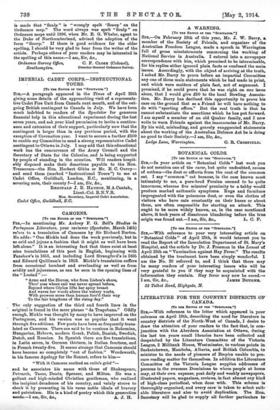CAMOENS.
(To Tim EDITOR Or Tee " arson:on:1
Snt,—In mentioning Mr. Aubrey F. G. Bell's Studies in Portuguese Literature, your reviewer (Spectator, March 14th) Were to a translation of Camoens by Sir Richard Burton. He adds : " One lllickle had done the work previously, but in so arid and jejune a fashion that it might as well have been left alone." It is an interesting fact that there exist at least nine translations of this poet in English, beginning with Fanshaw's in 1655, and including Lord Strangford's in 1805 and Edward Quillinan's in 1853. Miokle's translation suffers from occasional bombast and overloading as well as from aridity and jejuneness, as can be seen in the opening lines of the " Lusiad"
" Arms and the Heroes, who from Lisbon's shore, Thro' seas where sail was never spread before, Beyond where Ceylon lifts her spicy breast And waves her woods above the watery waste, With prowess more than human forc'd their way To the fair kingdoms of the rising day."
The only suggestion of the third and fourth lines in the original is found in the mere phrase " da Trapobana." Oddly enough, Mickle was thought by many to have improved on the Portuguese, and his version was so popular that it went through five editions. Few poets have been so frequently trans- lated as Camoens. There are said to be versions in Bohemian, Hungarian, Hebrew, modern Greek, Polish, Danish, Swedish, Dutch, and Russian. In Spanish there are five translations, in Latin seven, in German thirteen, in Italian fourteen, and in French twenty-five. It seems strange that Camoene should have become so completely "out of fashion." Wordsworth, in his famous Apology for the Sonnet, refers to him— "With it Camoens soothed an exile's grief "- and he associates his name with those of Shakespeare, Petrarch, Tasso, Dante, Spenser, and Milton. He was a gallant and high-minded Christian gentleman, who realized the incipient decadence of his country, and vainly strove to check it by presenting in his verse noble ideals of bravery and patriotism. His is a kind of poetry which this generation














































 Previous page
Previous page